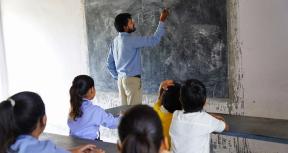The ongoing dominance of fossil fuels in global energy production accounts for more than 60% of overall greenhouse gas emissions. The Clean Energy Transition —the pathway for decarbonizing global energy— is essential for addressing climate change and will also provide a key means for the poor to access affordable, reliable, clean electricity. The transition will be central to achieving both the goals of the Paris Climate Accords and key elements of the Sustainable Development Goals, and experts agree that Renewable Energy (RE) has a vital role to play in the Clean Energy transition.
The Independent Evaluation Group (IEG) recently released its first systematic assessment of World Bank Group support for the supply of electricity from renewable energy. The evaluation looked at the evolution and the outcomes of the Bank Group’s approach from 2000 to 2017, and how well it helped developing countries address the myriad obstacles in the way of adopting renewable energy and seizing the opportunities presented by advances in RE technology, ranging from battery storage to solar and wind technology to system planning and integration of renewables.
In short, the World Bank Group has an important role to play. It is the single largest global contributor to RE in developing countries, where it is forecast that 70% of the required scale up in RE to meet the Clean Energy Transition goals will take place.
The Bank Group’s role in the development of RE extends beyond its financing, with support such as policy advice to create the right environment for RE scale up and the convening of partners to mobilize financing and technical support also having an important impact. Based on lessons drawn from almost two decades of Bank Group interventions, IEG has identified three key recommendations for leveraging the Bank Group’s comparative advantages to maximize the impact of its support for RE.
Recommendation 1: Focus on integration of renewable energy into the grid
The technical advances and the falling costs of wind power and solar photovoltaic present significant opportunities, but to seize them will require overcoming a common challenge presented by these RE technologies. They are variable because wind power only generates electricity when the wind is blowing, and solar photovoltaic only works when the sun is shining.
Countries will need to adapt their power systems to cope with these variable sources of electricity. Variable sources of power are projected to have the largest role in the RE scale-up, and the share of wind and solar photovoltaic in Bank Group RE projects has surged in line with global trends.
Integrating these variable sources of power into the grid to expand the power supply and replace higher carbon alternatives requires robust power system planning, adequate grid codes and standards for grid-friendly equipment, stronger and expanded transmission infrastructure to reach the often remote locations of RE installations, and the deployment of batteries or other storage technologies to convert variable sources of power into a continuous supply to the grid, known as base-load power.
Hydropower, which represented US$1 billion of the Bank Group’s US$4.5 billion RE portfolio from financial years 2018 to 2020, has the advantage of being able to store ‘fuel’. By building a reservoir along with the hydropower dam, water can be stored and released to generate more electricity when the grid calls for it. This flexibility can be used to balance the load on the grid and compensate for the intermittency of solar photovoltaic and wind power.
However, the scale of hydropower projects with storage are typically more complex to develop and can have greater environmental and social challenges. The Bank Group is supporting a decreasing number of large-scale hydropower projects with storage, with a shift to smaller-scale projects that rely solely on the flow of river water. In view of its track record as a dependable replacement for fossil fuels and its role in meeting the integration challenge, attention to developing hydropower with storage that meets high environmental and social standards should be a priority.
IEG found that less than 7% of the Bank Group RE portfolio in the evaluation period focused on integrating RE into power systems. With notable exceptions, such as the power system planning support to Egypt to develop its wind power, the majority of Bank Group projects focused primarily on addressing policy and regulatory barriers. While the latter is critical, developing countries will need support to meet the integration challenge to take advantage of the rapid expansion of wind power and solar photovoltaic.
Both China and Nicaragua had ambitious plans to expand wind power, and both faltered over lack of power systems planning to ensure the grid could handle the expanded source of intermittent power. The Bank Group is helping both countries address this issue, and lessons from experience should help guide similar integration challenges in other countries.
Recommendation 2: Take comprehensive approaches to addressing the barriers to RE
IEG found that RE development proved more successful when the Bank Group engaged systematically over time, strengthening its relationships, and progressively and comprehensively helping countries implement the necessary reforms to remove barriers to RE development.
These barriers include the right policies and regulatory environment to encourage the development of RE, power systems capable of integrating variable sources of power, the capacities to undertake new investments in RE and operate ongoing projects, and the ability to create the right environment to attract investors and mobilize the high up-front investments needed for RE.
The Bank Group can build on the comparative advantages its constituent institutions to provide the kind of comprehensive support that addresses multiple barriers. While the World Bank can utilize its lending and technical advisory capacity to focus on RE policies and integration, the Bank Group’s private sector arm, the International Finance Corporation (IFC) can work on mobilizing private capital and promoting the adoption of environmental and social performance standards and mechanisms for scaling-up, and the Bank Group’s risk guarantee agency, the Multilateral Investment Guarantee Agency can further extend its risk mitigation portfolio to cover a wider range of RE technologies.
This coordinated and comprehensive support can have a significant impact. In 2002, the World Bank and IFC coordinated to rehabilitate the Pamir hydropower plant in the very poor Badakhshan region of eastern Tajikistan, mobilizing private finance and development partners for the first private investment in the country’s energy sector.
Following the collapse of the region’s diesel plant, the local population in Badakshan had been forced to resort to wood as fuel, schools and other public institutions closed during the winter, and indoor pollution rose as economic activity stalled. The Pamir hydropower plant now ensures 96% of households in Badakhshan enjoy 24 hours of electricity per day, all year-round.
Recommendation 3: Keep Bank Group knowledge and skills up to date
While there have been notable successes, keeping up with the dynamic nature of RE requires cutting-edge knowledge. It is important for the Bank Group to keep its knowledge up to date of technological changes and the evolving nature of policy and regulatory requirements on RE overall and specifically on integration, including storage and distributed generation, as well as financial structuring skills to mobilize private capital investment in RE. This will require constantly updating knowledge on issues ranging from power systems planning to pricing policy and procurement.
Conclusion
There are a range of studies that propose different pathways to the Clean Energy Transition, but they are unanimous in calling for a momentous expansion of RE. The Bank Group has an important role to play in working with developing countries to achieve this goal. To maximize the impact of Bank Group support, IEG recommends prioritizing interventions that focus on integrating RE sources into power systems, as part of comprehensive, long-term country engagements, with coordinated Bank Group solutions, backed by specialized skills that are continually updated to help developing countries address their pressing and rapidly evolving challenges to scale-up RE.









Comments
Wonderful Prof Salman Raza…
Wonderful
Prof Salman Raza Principal Government Degree Boys College 5L New Karachi Pakistan College Education Department Government of Sindh Province Pakistan Prof of Zoology World Renowned Zoologist and Entomologist
Add new comment